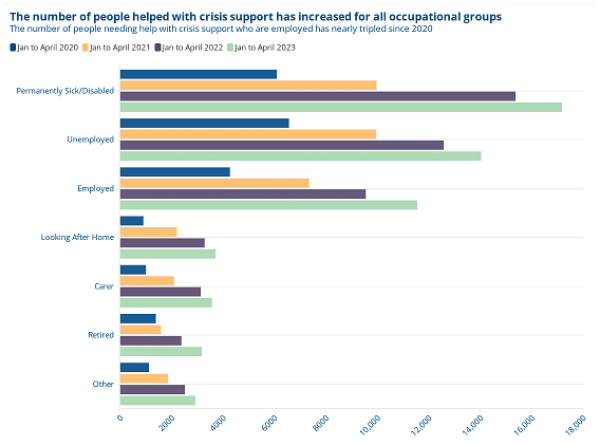‘Our bleakest-ever start to the year’ Citizens Advice May cost of living briefing
‘A record number of records.’ That was how Citizens Advice CEO Dame Clare Moriarty summed up the ‘bleakest-ever start to a year’. To explain Dame Clare cited: more people needing help, more food bank referrals, more prepayment meter problems.
Using detailed real time data the latest CA monthly cost of living public briefing* described a worrying situation:
- High inflation in essential products and services – up £300 a month in some cases
- More households in negative budget (when essential costs exceed income)
- Most affected are single adults, private renters, people with living with disability or long-term illness
- Big rise in calls for help from people in work.

At the online event we had the benefit of 2 external viewpoints, from Carys Roberts, Institute of Public Policy Research and Paul Johnson, Institute of Fiscal Studies. Using their own organisations’ extensive research both confirmed the CA analysis.
Carys Roberts
Ms Roberts’ concern is to highlight where the need social policy is most urgent. She believes housing and energy costs have moved to permanently higher and unaffordable levels. The government should recognise this and act now on costs and incomes or risk making the crisis worse. Among her notable policy asks are:
- Improve incomes not through one-off supplements but consolidated increases
- Increase child benefit
- Recognise the true cost of housing by unfreezing the local housing allowance
- Reduce the damaging impact of current benefit reductions which stops many households achieving a balanced budget.
Paul Johnson
In policy circles Mr Johnson is something of a celebrity, although such a description would be very misleading. The IFS which he has led since 2011 is the most trusted economic think tank and universally respected for its political neutrality.
In his opening summary he said the CA data were both very useful and ‘fantastically awful’. They fitted what he called ‘the biggest cost of living crisis in a generation’; the country was seeing the ‘biggest fall in living standards since the 1950s’. His reform proposals added to the picture, notably on incomes and work. Government should:
- Increase benefits in line with inflation – the way indexing works at the moment is not fit for purpose in leaving the poorest people always falling behind
- Unfreeze local housing allowance (and acknowledge the case for including mortgages where appropriate)
- Recognise that more people in poverty are now in work than not working
- Reconsider the purpose of benefit policy – originally to help those in greatest poverty, now people in work (that’s not a bad purpose but it’s wrong to make children suffer)
- Try to make the labour market work better; worklessness has halved in the past 25 years but almost all new work is insecure and low paid; it’s hard for people to progress if they are ‘stuck on low pay and welfare’.
Sign up for our next cost-of-living briefing on 5 June. Our focus will be the increasing number of people depending on foodbanks. Joining Dame Clare Moriarty will be CA Chief Data Analyst Tom MacInnes, Trussell Trust Chief Executive Emma Revie and Chief Executive at Mind Dr Sarah Hughes.
* Online monthly Cost of Living Briefing, 11 May 2023. Watch the recording here.
